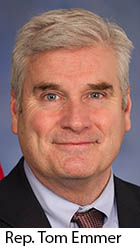
Rep. Emmer Introduces Bill to Eliminate Barriers for Self-Employed Individuals
 Rep. Tom Emmer, R-Minn., jumped-started efforts on Capitol Hill to improve access to mortgages for those working in the “gig” economy by introducing Mortgage Bankers Association-supported legislation that would allow lenders to verify income through other forms of documentation.
Rep. Tom Emmer, R-Minn., jumped-started efforts on Capitol Hill to improve access to mortgages for those working in the “gig” economy by introducing Mortgage Bankers Association-supported legislation that would allow lenders to verify income through other forms of documentation.
The Self-Employed Mortgage Access Act (https://emmer.house.gov/sites/emmer.house.gov/files/EMMER_017_xml.pdf) would allow access to mortgages for those receiving steady forms of income by allowing lenders to verify an applicant’s income using additional forms of documentation. It would allow lenders to use widely accepted documentation standards, already approved by federal agencies, to underwrite income earned through self-employment or gig economy work.
Gig economy workers and self-employed workers make up about 30 percent of the population. Many have trouble qualifying for a mortgage because of confusing guidelines that work for self-employed borrowers and how they’re underwritten.
“America was founded by innovators, and no one embodies that spirit more than the self-employed,” Emmer said. “These individuals should not suffer unnecessary obstacles because of their dedication to create a better life for themselves and their family. They deserve to own a home and build their American dream, and needless government regulation should not stand in their way.”
The Emmer bill is fundamentally similar to legislation introduced last September in the Senate by Sens. Mark Warner, D-Va., and Mike Rounds, R-S.D. (https://www.warner.senate.gov/public/index.cfm/pressreleases?id=6A1A5F0F-D1D7-420A-B700-056C768DF750).
Both bills embody recommendations made by MBA to the Consumer Financial Protection Bureau that would allow use of existing underwriting standards, such as those found in the Fannie Mae and Freddie Mac Seller/Servicer Guides or the FHA, VA and USDA Handbooks, as alternatives to Appendix Q. These existing standards could be used to satisfy the requirements needed for a loan to achieve Qualified Mortgage status.
In an March MBANow video (https://www.mba.org/publications/insights/archive/mba-insights-archive/2018/mbanow-mba-president-and-ceo-bob-broeksmit-cmb-on-gig-economy-legislation), MBA President and CEO Bob Broeksmit, CMB, said these bills would better ensure that all consumers are treated on a level playing field in mortgage underwriting, and “seek to give more options for lenders to reasonably and responsibly qualify self-employed borrowers.”
“While Appendix Q in the Qualified Mortgage rule does provide a way to underwrite self-employed borrowers, there are other sensible methods, such as those used by Fannie Mae and Freddie Mac, that could be used if this bill were passed, so that loans that aren’t sold to Fannie Mae and Freddie Mac could use that sensible underwriting and more deserving borrowers could be qualified,” Broeksmit said.
Broeksmit noted that bill does not undermine current ability to repay standards. “Our intent is to help people who can stay in homes and have sustainable homeownership. This bill would let lenders use other standards already in place that some of the government agencies to qualified their self-employed borrowers,” he said.
In March, the Mortgage Action Alliance, MBA’s grassroots advocacy arm, issued a Call to Action asking its members to contact their Members of Congress to urge co-sponsorship of such legislation.
The Emmer bill is co-sponsored by Rep. Bill Foster, D-Ill. “We need to ensure these people aren’t being unfairly disadvantaged from homeownership because they don’t have the same income documentation, like paystubs or W-2s-as people with traditional jobs,” he said. “Simply put, this legislation levels the playing field for creditworthy consumers to pursue homeownership.”
In addition to MBA, the bill has support of the Consumer Federation of America and The Milken Institute.
